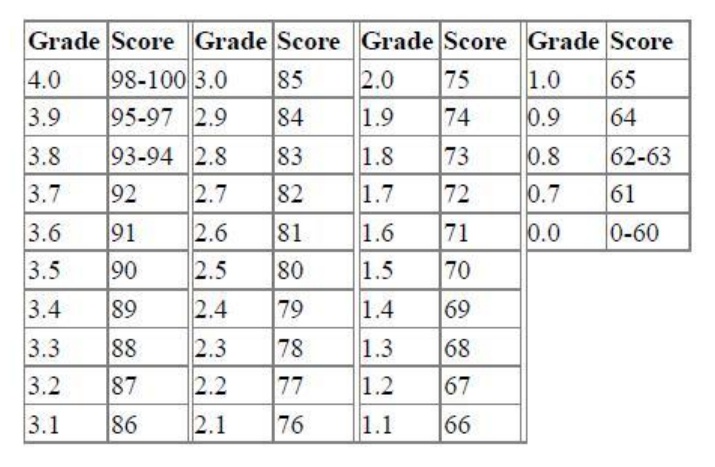TCSS 558: |
|
|
|
Grading Policy Weights are assigned to the different elements of the course as listed below. Points are added up at the end of the quarter and weighted accordingly to determine a total percentage score. The percentage score is translated into a final decimal point (4.0 max) grade.
UW Grading Scale 
Quizzes/Reviews/Activities/Tutorials In class there will be a variety of assignments throughout the quarter that fall into the "Grab Bag" category. These include in-class quizzes related to the reading, active learning activities associated with the lecture, active reading online quizzes, and research paper reviews (1-2 page critiques). All of the assignments in the "Grab Bag" constitute 15% towards the overall course grade. Some quizzes will be in class, while others will be online on the Canvas system. The objective of these assignments is to help reinforce material from reading and lectures, and to help prepare for the exams. In the past, I've offerred skill-based tutorials as "quizzes" to help practice different programming techniques and technologies required for the programming projects. If enough students request a "refresher", I will likely design a tutorial and offer credit as a "quiz". The lowest 2 scores will be dropped from this "Grab Bag" category at the end of the quarter. Exams / Projects There will be two exams during the quarter, the midterm exam, and the final exam. Each is comprehensive covering conceptual areas of the course. There will be no make-up exams or quizzes. Please schedule vacations, job interviews, family visits, etc. around the exams. If there is a family or medical emergency that prevents attendance during the midterm or final exam, please arrange by providing written explanation as soon as possible to request a make-up exam. Given the extreme difficulty to create multiple versions of tests with identical difficulty, and to ensure fairness to everyone, makeup exams will be a similar length and format, but will feature more difficult questions. It is expected that since make up exams will generally occur after the original exam, students will have additional time to prepare for a more rigorous exam. The best plan is to make every effort to take exams when originally scheduled. All programming projects are due at 11:59 PM on the due date. There is a late penalty of 7.5% per day. Submissions more than 48 hours late will not receive a grade. To ensure fairness in grading it is desirable to evaluate all assignments together, and not after long lapses. Therefore assignments must be submitted within the 48-hour window to be considered. All assignments will be posted at least two weeks prior to the due date. Programming projects will relate to distributed systems concepts from the lecture and readings throughout the quarter. Projects should be implemented using Linux, Docker, Docker-Machine, and the Amazon Elastic Compute Cloud (EC2). Within Docker you may choose your own Linux distribution (recommended are Ubuntu or CentOS). It is *HIGHLY* recommended to create a local Linux Virtual Machine on a laptop or desktop computer (Ubuntu or CentOS) to support program development. However it is entirely feasible to develop using Windows, and simply make deployments to Linux containers. The projects will focus on distributed system concepts. The details of each project will be posted HERE. Completed projects will be submitted through Canvas. It should be possible to compile projects from source using a makefile or maven from the command line. Academic Integrity and Collaboration Policy To quote the UWT statement of values, "our fundamental purpose is to educate students for life as global citizens." Students are active participants in their education and are expected to uphold high standards of academic conduct. Any action that subverts the educational process or misrepresents student knowledge and abilities constitutes academic dishonesty. In this course some assignments and all exams must be completed individually. However, limited collaboration is permitted as follows: These actions are acceptable:
These actions are not acceptable:
Group assignments operate similarly, with members of the same group freely able to collaborate with one another, but different groups being limited as above. Students found to violate the academic integrity policy may be subject to forfeiture of credit for assignments, failure of the course, and/or disciplinary action by the University. |